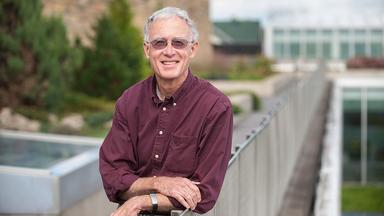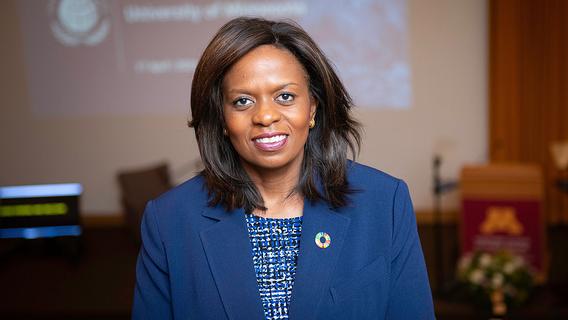
It was a homecoming more than two decades in the making for Sanda Ojiambo an alumna of the Humphrey School of Public Affairs, who recently visited the School for the first time since she graduated with her master’s degree in public policy in 1997.
Ojiambo is an Assistant Secretary-General of the United Nations, and executive director and CEO of the United Nations Global Compact.
She spent two days at the University of Minnesota in Minneapolis last month, combining personal aspects—like touring campus and renewing relationships with faculty members from her student days—with official duties such as delivering a public lecture about corporate social responsibility and meeting with Minnesota business leaders on that topic.
Born and bred in Kenya, Ojiambo has more than 20 years of experience in the public and private sectors across Africa and globally, during which she has focused on sustainable development and sustainable business.
Walk down memory lane
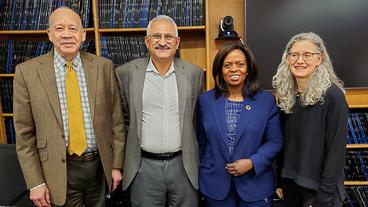
Ojiambo earned her bachelor’s degree at McGill University in Montreal, and said she decided on the Humphrey School for her graduate studies because of its strong focus on international policy.
“I am so happy to be here,” Ojiambo said, noting that a lot of things have changed on campus since she was last here in 1998.
“I have such fond memories of my days at the University of Minnesota—the long winters, the balmy mosquito summers, and student life in all of its many facets, including being a teaching assistant [for Professor Samuel Myers Jr.] and gritting my teeth through a number of classes.”
During her visit, Ojiambo met with a group of Humphrey School faculty members, including Myers and two others who were among her instructors in the mid-1990s—Professors Ragui Assaad and Deborah Levison, who was the advisor for her final paper.
Levison recently looked through her files and found Ojiambo’s final paper: “HIV/AIDS in Uganda: A Demographic Analysis of the Disease and a Critique of the Government's Policy Response.”
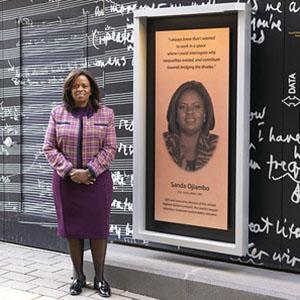
“She was always a great student, and her grades showed it. … she did her work beautifully,” Levison recalled. “She was a quiet person, but when she spoke she always had a good point to make. I'm not surprised she's gone far. She wanted to get her degree, go back and make a difference. It seems like she has done that.”
Ojiambo said it was “heartwarming” to see those faculty members again. They taught her about “the discipline of getting to the root cause of issues, using data to robustly develop hypotheses. And of course, they taught me why public policy and policy analysis are so important for building a better world. It was not always easy, but I am grateful,” she said.
Ojiambo also had a chance to see her plaque displayed on the University’s Scholars Walk, a four-block-long outdoor tribute that celebrates the accomplishments of hundreds of faculty, alumni, and students. Ojiambo is recognized as an outstanding alumna of the University.
Sustainability and corporate responsibility
Ojiambo spoke at various events, including a student gathering and a public lecture, to discuss her work at the UN Global Compact and its focus on the major role that business plays in addressing climate change and sustainability.
“The world has learned the hard way that no one entity, including governments or the UN, can be expected to solve global crises alone. And these ongoing crises have also taught us that businesses cannot act independently of their environments,” she said during her lecture.
The UN Global Compact works to build bridges among the UN, governments around the world, and the business community, towards solving the world’s biggest problems.
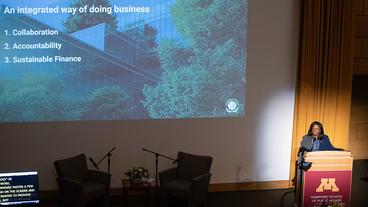
“Our work is based on the knowledge that when companies put longer-term sustainability over short-term profits, transformation is possible. It’s also just good business,” Ojiambo said “We have seen first hand that the business community is uniquely positioned to help advance the sustainable solutions that the world needs.”
The UN Global Compact has established a list of 10 Principles to guide businesses toward sustainable practices, and the organization provides support for businesses on their sustainability journey. The principles cover issues such as respect for human rights, living wage policies, and reductions in pollution and greenhouse gas emissions, among others. Ojiambo described these principles as “timeless, and fundamental to how businesses should operate.”
Another challenge for businesses is finding employees who have education and training in sustainability practices. While the demand for those skills is growing, business leaders say colleges are not preparing enough students for sustainability jobs.
“Along these lines, I am pleased to see the efforts that the University of Minnesota has made to integrate [sustainable development goals] into curricula, discourse and projects,” Ojiambo said.
A new initiative at the University, the Sustainable Environmental, Social, and Governance Leadership Certificate, will launch in the fall as a joint effort of the Humphrey School, the Carlson School of Management, and the Institute on the Environment. The graduate-level certificate program, which is designed for working professionals as well as graduate students, will equip individuals with the skills they’ll need to advance sustainability efforts in their organizations and communities.
Message to students
Ojiambo offered some career advice and observations to the students she met with in a human rights class and at an informal lunch conversation.
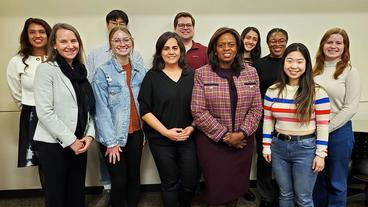
Because the field of sustainability is changing so quickly, she said students who are interested in a career in that area should have a broad base of knowledge on the topic and related areas; global experience and/or an awareness of international issues; and “soft skills” such as communication, teamwork, and adaptability.
“Sustainability can't be dealt with from a singular perspective,” Ojiambo said. “Corporations are in a difficult space now, because sustainability is not just the job of one person or team. It’s across departments as well as in the leadership suite. There’s never been a time of more awareness of the issue, and companies are more likely to take on the challenge.”
In answer to the question, “What is the most useful skill you learned at the Humphrey School and how are you applying it?” Ojiambo replied, “problem solving.”
“The track I followed [during my time here] was very heavy on economics and understanding public policy,” she said. “Cost-benefit analysis helped me analyze problems differently. It taught me not to rush to make decisions but also to look at the opportunity costs.”
“The job market is much more open to policy-related expertise” than it was when she completed her degree, Ojiambo added. “I have applied my policy training in every single job that I have had.”
